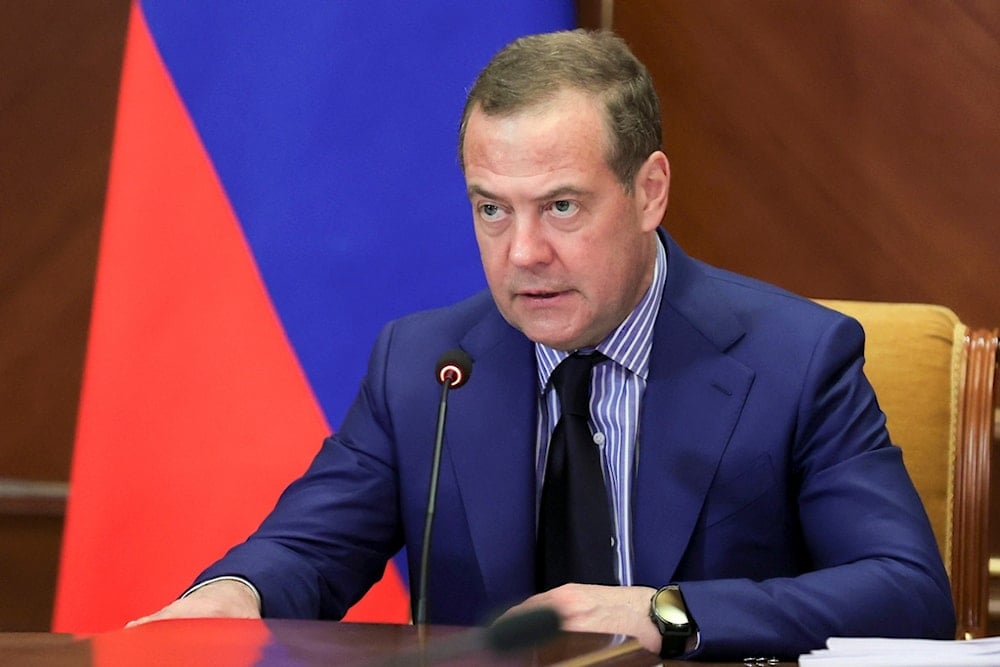Europe must swallow JD Vance's 'humiliating rebuke': Medvedev
Reacting to Vance's comments, Medvedev noted that the anti-Russian sentiment at the conference was shaken by the US vice president's blunt remarks.
-

Russian Security Council Deputy Chairman and the head of the United Russia party Dmitry Medvedev chairs a meeting of the Presidium of the Presidential Council for Science and Education at the Gorki state residence outside Moscow, Russia, Monday, Dec. 23, 2024 (Ekaterina Shtukina, Sputnik Pool Photo via AP)
Russian Security Council Deputy Chairman Dmitry Medvedev has weighed in on US Vice President JD Vance's speech at the Munich Security Conference, stating that while European leaders will tolerate his remarks, they will deeply resent them.
During his address on Friday, Vance blamed Europe for its own political instability, asserting that its crisis is not primarily the result of external forces like Russia or China. He pointed to the annulment of Romania's election results and concerns about a similar scenario unfolding in Germany as key examples of Europe's self-inflicted struggles.
Reacting to Vance's comments, Medvedev noted that the anti-Russian sentiment at the conference was shaken by the US vice president's blunt remarks.
"This time, the anti-Russian mayhem in Munich was greatly alarmed by the very provocative speech of Vice President Vance ... Everyone expected perfunctory partnership overtures to Europe and comments on [US President] Donald Trump's words about putting an end to the Ukrainian conflict. But he turned around and told his own to the Europeans who have completely lost themselves in recent years ... If he were not a high-ranking US official, they might call him on it, but he is, and they will let it slide and swallow with hatred this humiliating rebuke they got from a senior partner," Medvedev wrote on social media.
The Russian official agreed with Vance's assessment, calling his remarks "the complete truth" and labeling him a "brave guy" for speaking so candidly, though he suggested that Vance lacks the necessary experience for his position.
"The time of this Europe is long gone. It is indeed weak, unattractive, and virtually no one needs it anymore except itself," Medvedev added, reinforcing Russia's narrative of European decline.
Read more: Nuclear arms transfer to Kiev would be an 'attack' on Russia: Medvedev
Vance’s speech sparked controversy, as he not only criticized Europe’s handling of its political instability and downplayed external threats like Russia and China, but also called for greater tolerance of right-wing parties—prompting both praise from Russian officials and backlash from European leaders.
'Foreign Intervention'
Earlier today, German Chancellor Olaf Scholz rejected Vance's sharp criticism of Europe, calling it an unacceptable intervention in democratic processes. Speaking from the same stage at Munich, Scholz pushed back against any outside influence on German politics, particularly Vance's apparent endorsement of far-right parties.
"We will not accept outsiders intervening in our democracy, in our elections. That is not appropriate—especially not among friends and allies," Scholz stated, referencing Germany's firm stance against the inclusion of far-right groups in governing coalitions.
He also criticized Vance's "never again" pledge, made from the Dachau concentration camp, pointing out that it contradicts any support for the far-right Alternative for Germany (AfD), a party whose members have downplayed Nazi-era crimes.

 3 Min Read
3 Min Read









